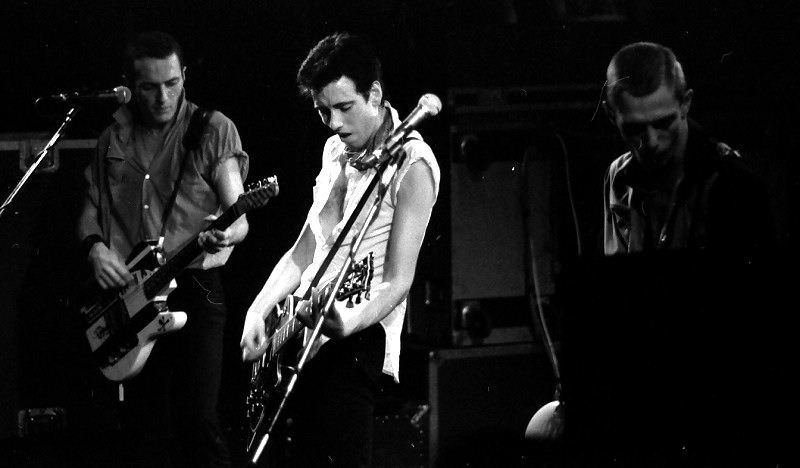
The Clash
The Clash were an English rock band that formed in London in 1976 and were key players in the original wave of British punk rock. Billed as "The Only Band That Matters", they used elements of reggae, dub, funk, ska, and rockabilly, and they contributed to the post-punk and new wave movements that followed punk. For most of their recording career, the Clash consisted of lead vocalist and rhythm guitarist Joe Strummer, lead guitarist and vocalist Mick Jones, bassist Paul Simonon, and drummer Nicky "Topper" Headon.
This article is about the English band. For their debut studio album, see The Clash (album). For the Thai band, see Clash (Thai band). For other uses, see Clash (disambiguation).
The Clash
The Clash achieved critical and commercial success in the United Kingdom with the release of their debut album The Clash (1977) and their second album Give 'Em Enough Rope (1978). Their experimental third album London Calling, which was released in the UK in December 1979, earned them popularity in the United States, where it was released the following month. A decade later, Rolling Stone named London Calling the best album of the 1980s. Following continued musical experimentation on their fourth album Sandinista! (1980), the band were more successful with the release of Combat Rock (1982), which includes the US top-10 hit "Rock the Casbah", helping the album to achieve a 2× platinum certification there.
In 1982, Headon left the band due to internal friction surrounding his increasing heroin addiction, and Jones departed the following year. With a new lineup, the band released their final album Cut the Crap in 1985 before disbanding a few weeks later.[1]
In January 2003, shortly after the death of Joe Strummer, the band, including original drummer Terry Chimes, were inducted into the Rock and Roll Hall of Fame. In 2004, Rolling Stone ranked the Clash number 28 on its list of the "100 Greatest Artists of All Time".[2]
History[edit]
Origins: 1974–1976[edit]
Before the Clash's founding, the band's future members were active in different parts of the London music scene. Joe Strummer, whose real name was John Graham Mellor, sang and played rhythm guitar in the pub rock band The 101ers, which he had formed in 1974 with Alvaro Pena-Rojas.[3] Mellor later abandoned his original stage name "Woody" Mellor in favour of "Joe Strummer", a reference to his rudimentary strumming skills on the ukulele while he was a busker in the London Underground.
Mick Jones played guitar in protopunk band London SS,[3] who rehearsed for much of 1975 but never played a live show and recorded only one demo. London SS were managed by Bernard Rhodes, an associate of impresario Malcolm McLaren and a friend of the members of the Sex Pistols, whom Mclaren managed. Jones and his bandmates became friendly with Sex Pistols members Glen Matlock and Steve Jones, who helped them as they auditioned potential new members.[4] Vocalist Paul Simonon and drummer Terry Chimes auditioned for London SS but were rejected,[5] and Nicky Headon drummed with the band for a week then quit.[6][7]
After London SS broke up in early 1976, Rhodes continued as Jones' manager.[3] In February, Jones saw the Sex Pistols perform for the first time and commented: "You knew straight away that was it, and this was what it was going to be like from now on. It was a new scene, new values—so different from what had happened before. A bit dangerous."[8] In March of that year, at the instigation of Rhodes, Jones contacted Simonon and suggested he learn an instrument so he could join the new band Jones was organising.[5] Soon Jones, Simonon on bass, Keith Levene on guitar and "whoever we could find really to play the drums" were rehearsing.[9] Chimes was asked to audition for the new band and was accepted but quit soon after.[10]
The band were still searching for a lead singer. According to Chimes, Billy Watts, who "seemed to be, like, nineteen or eighteen then, as we all were", handled the duties for a time.[11] Rhodes was watching Strummer, with whom he made exploratory contact; both Jones and Levene had seen Strummer perform and were impressed.[12] In April, Strummer had seen the Sex Pistols, the opening act for one of his band's gigs. Strummer later said:
Classic lineup (1977–1982)[180]